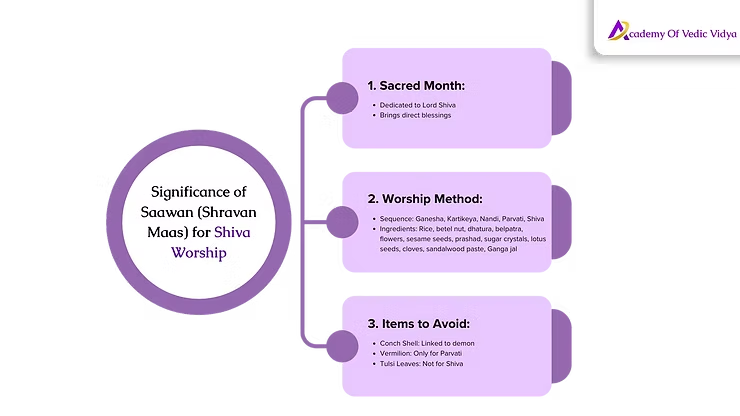In the Hindu calendar, Saawan, sometimes called Shravan Maas, is a unique month devoted to Lord Shiva. Worshiping Lord Shiva at this hour is thought to result in direct blessings. Every Monday throughout the month, a large number of Hindus perform Shiva Puja, and some even observe the Solah Somvar fast throughout Saawan. Lord Shiva, revered as the god of destruction, finds satisfaction in these rituals, granting fulfillment of devotees’ wishes.
But why does Hinduism place such a high value on worshiping Lord Shiva in Saawan? Let’s analyze the meaning of the ritual and discover why Shiva worshipers celebrate this month with such great affection.
Why Is Shravan Maas Considered as the Month of Shiva Worship?
In the Hindu calendar, Shravan Maas (which falls after Ashadh Maas) is a month when the Hindu community devotes a great deal of affection to Lord Shiva. This month is said to be the time of the Samudra Manthan, or churning of the ocean. Different things surfaced during this churning, and the gods and devils split them up. But the poison (vish) that also leaked was not taken by anyone. Lord Shiva swallowed the poison and held it to his neck in order to rescue the universe from destruction. His neck turned blue as a result, and he was known as Neelkanth. Shiva lost consciousness and fell to the ground. The creator, Brahma, rescued Shiva by bathing him in Ganga water and performing an Abhishek to reduce the effects of the poison. For this reason, followers go barefoot to gather water from the Ganga in Haridwar, a custom known as Kawad in Hindi, and present it to a Shivling in their temple
Ways for Worshiping Lord Shiva
According to mythology, you should worship Lord Ganesha first, then Swami Kartikeya, Nandi, Goddess Parvati, and finally, Lord Shiva. Sit with your back to the east. The ingredients you’ll need: rice, betel nut, dhatura, belpatra (bilva leaves), flowers, til (sesame seeds), prashad, misri (sugar crystals), kamal gatta (lotus seeds), laung (cloves), chandan (sandalwood paste), and Ganga jal (water from the Ganges). Mix Gangaajal with pure water and pour it over all the gods in the order mentioned above. Offer panchamrit to all the gods, then pure water mixed with Ganga jal. Apply chandan on the foreheads of all the gods and vermillion on Maa Parvati.Offer all the gods rice, dhatura, flowers, belpatra, til, roli, moli (sacred thread), supari, janeu (sacred thread), kamal gatta, and any fruit. Chant the Shiva Mantra, Shiva Chalisa, and Shiva Aarti in front of Shiva after lighting a diya (lamp) with ghee and incense. There are numerous mantras for calming Lord Shiva, such as the Maha Mritunjaya Mantra, which, when performed on a daily basis, offers his blessings.
Listen to the Solah Somvar Vrat Katha. Go through the Saawan Somvar Vrat Katha if you are fasting just for Saawan Somvar. Check out the advantages of Shiva Sahasranam as well.

Items that should not be offered to Lord Shiva
Belpatra and Dhatura are the two things that are required to worship Lord Shiva in order to please him and get his blessings. But there are also some offerings to Lord Shiva that you ought to stay away from making. Here are few key things to keep in mind:
Offering a conch shell (shankh) is improper since it is connected to the demon Shankhchood, whom Lord Shiva slain. For this reason, water in a conch shell is not presented to Shiva.
Refuse to give Vermilion or Sindoor: You may present Kumkum or Sindoor to Maa Parvati, but not to Lord Shiva. Apply Chandan tika or sandalwood paste to his forehead or Shivling instead.
Don’t gift Tulsi Leaves to Shiva: It is improper to present Tulsi Leaves to Lord Shiva.
Conclusion
In conclusion, the month of Shravan has special significance in the Hindu tradition of worshiping Lord Shiva. It celebrates Shiva’s divine deed of taking the poison when the ocean was churning in order to preserve the universe, which gave him the nickname Neelkanth and his blue throat. During this month, which is marked by intense devotion, devotees give prayers, fast on Mondays (Solah Somvar), and carry out rites like the Abhishek using Ganga water. By participating in these rituals, devotees strengthen their trust and bond with the divine and ask Lord Shiva for blessings of harmony, serenity, and spiritual enlightenment.
If you’re interested in delving deeper into Astrology course, visit our website and explore our comprehensive courses. We also offer personalized mentorship. Each program is meticulously crafted to provide an in-depth understanding of astrological principles and their practical applications, equipping you with the knowledge and skills to become a professional astrologer and predict the future accurately.
For further information contact us at ( +91) 7439041439





